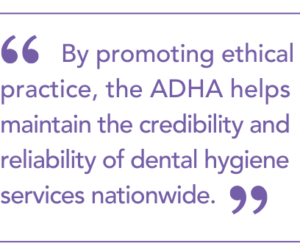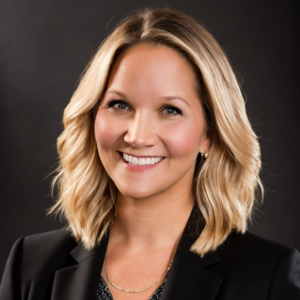by Dr. Emily Boge, EdD, RDH, CDA, FAADH, FADHA, CDIPC
March 27, 2025
The profession of dental hygiene is critical to maintaining the overall health and well-being of the American public.
Dental hygienists serve as the frontline in preventive oral healthcare, providing essential preventive services that reduce the prevalence of dental diseases and improve the quality of life in both traditional practices, and alternative public health settings. Given the importance of their work, it is imperative that dental hygienists adhere to a strong ethical framework. This is where the American Dental Hygienists’ Association (ADHA®) plays a vital role. From the perspective of the United States Department of Ethics, professional organizations such as the ADHA are indispensable in upholding standards of ethical practice, ensuring public trust, and fostering professional accountability.1,2
The Necessity of a Professional Code of Ethics
Each profession, particularly those that serve public health and well-being, requires a robust ethical framework to guide practice. A code of ethics provides professionals with clear expectations, supports ethical decision-making, and safeguards the interests of both practitioners and the public. Without such a framework, there is a heightened risk of ethical violations, professional misconduct, and diminished public confidence in the profession.3
The ADHA has established a comprehensive Code of Ethics that serves as a guiding document for dental hygienists across the nation. This code outlines the responsibilities of practitioners, establishes ethical obligations, and ensures consistency in the application of ethical principles. It reinforces the core values of integrity, responsibility, and professionalism, which are essential in any healthcare setting.4
Upholding Public Trust
 Trust is the foundation of any healthcare profession. Patients must feel confident that their providers act in their best interests and adhere to ethical standards. The ADHA’s Code of Ethics fosters this trust by holding dental hygienists to high ethical standards. It ensures that professionals prioritize patient care over personal gain, avoid conflicts of interest, and provide services based on scientific knowledge and evidence-based practices.1 Without a governing body to enforce these ethical principles, there is a risk of diminished trust in dental professionals. Ethical lapses can lead to patient harm, legal consequences, and a general decline in the reputation of the profession. By promoting ethical practice, the ADHA helps maintain the credibility and reliability of dental hygiene services nationwide. Without a unified professional association, the public will likely have less confidence in the choices made by that profession.
Trust is the foundation of any healthcare profession. Patients must feel confident that their providers act in their best interests and adhere to ethical standards. The ADHA’s Code of Ethics fosters this trust by holding dental hygienists to high ethical standards. It ensures that professionals prioritize patient care over personal gain, avoid conflicts of interest, and provide services based on scientific knowledge and evidence-based practices.1 Without a governing body to enforce these ethical principles, there is a risk of diminished trust in dental professionals. Ethical lapses can lead to patient harm, legal consequences, and a general decline in the reputation of the profession. By promoting ethical practice, the ADHA helps maintain the credibility and reliability of dental hygiene services nationwide. Without a unified professional association, the public will likely have less confidence in the choices made by that profession.
Professional Accountability and Continuous Education
Another crucial function of a professional association like the ADHA is fostering accountability within the profession. Ethical breaches can occur in any field, and without the oversight and creation of policy by a delegation body of peer dental hygienists, there is no mechanism for addressing violations. The ADHA ensures that dental hygienists adhere to ethical standards through continued professional development, peer review, and disciplinary action when necessary.3
Moreover, the field of dental hygiene is constantly evolving, with new technologies, treatments, and best practices emerging regularly. Ethical practice requires that professionals stay informed and educated to provide the best possible care. The ADHA offers continuing education opportunities, ethical guidance, and professional development resources that help hygienists maintain competence and adhere to current ethical standards.4
Protecting Vulnerable Populations
Dental care is a fundamental aspect of overall health, yet many individuals, particularly those in underserved communities, lack access to proper oral healthcare. Ethical guidelines set forth by the ADHA emphasize the responsibility of dental hygienists to advocate for and provide care to vulnerable populations. These include children, the elderly, low-income individuals, and those with disabilities.5
The ADHA’s ethical framework encourages practitioners to engage in community outreach, volunteerism, and public health initiatives to bridge gaps in healthcare disparities.4 Without a formal association promoting these ethical obligations, many underserved populations might not receive the preventive care they need, exacerbating public health issues.
Addressing Ethical Dilemmas
![[The Code] helps dental hygienists balance professional responsibilities with ethical considerations, ensuring that their decisions align with both legal requirements and moral principles.](https://www.adha.org/wp-content/uploads/2025/03/HH_Quote_Boge-2-300x276.png) Healthcare professionals, including dental hygienists, frequently encounter ethical dilemmas in their practice. These can include issues related to patient consent, confidentiality, treatment planning, and interactions with other healthcare providers. Without a guiding ethical framework, practitioners may struggle to navigate these complex situations.1 The ADHA’s Code of Ethics provides clarity on how to approach ethical dilemmas while prioritizing patient welfare. It helps dental hygienists balance professional responsibilities with ethical considerations, ensuring that their decisions align with both legal requirements and moral principles.4
Healthcare professionals, including dental hygienists, frequently encounter ethical dilemmas in their practice. These can include issues related to patient consent, confidentiality, treatment planning, and interactions with other healthcare providers. Without a guiding ethical framework, practitioners may struggle to navigate these complex situations.1 The ADHA’s Code of Ethics provides clarity on how to approach ethical dilemmas while prioritizing patient welfare. It helps dental hygienists balance professional responsibilities with ethical considerations, ensuring that their decisions align with both legal requirements and moral principles.4
Preventing Exploitation and Misconduct
In any profession, there is a potential for unethical behavior, whether intentional or due to lack of awareness. Without a professional organization like the ADHA, dental hygienists might be more vulnerable to exploitation, workplace misconduct, and unethical employer practices.5
The ADHA advocates for fair working conditions, appropriate compensation, and ethical treatment of dental hygienists within the industry. It also provides a platform for professionals to voice concerns and seek guidance when they encounter ethical challenges in the workplace. By setting ethical standards, the ADHA protects not only patients but also practitioners from unfair treatment and unethical expectations.4
Ethical Leadership and Advocacy
Professional organizations play a significant role in advocating for ethical policies and legislation that impact their field. The ADHA actively participates in legislative efforts to promote policies that align with ethical principles, such as expanding access to dental care, improving workplace conditions for dental hygienists, and ensuring the integrity of the profession.4
Without an organized professional body advocating for ethical considerations, dental hygienists might lack representation in crucial policy discussions. The ADHA ensures that ethical concerns remain at the forefront of legislative and regulatory decision-making processes. The American Dental Hygienists’ Association is essential in upholding ethical standards, ensuring public trust, and fostering professional accountability within the field of dental hygiene. From the perspective of the United States Department of Ethics, every profession requires a dedicated ethical framework to guide practitioners and protect the interests of the public.2
Through its Code of Ethics, advocacy efforts, and educational initiatives, the ADHA plays a critical role in maintaining the integrity of the profession, ensuring that dental hygienists operate within an ethical framework that prioritizes patient welfare, professional responsibility, and continuous learning.
Without such an organization, there is a greater risk for ethical lapses, diminished public confidence, and increased disparities in care, therefore, the presence and continued influence of the ADHA are not only beneficial but necessary for the health and ethical integrity of dental hygiene professionals across the United States.
____________________________________
References:
1Beemsterboer, Phyllis L. Ethics and Law in Dental Hygiene. 3rd ed. St. Louis: Elsevier, 2016.
2United States Office of Government Ethics. “United States Office of Government Ethics.” Accessed March 21, 2025. https://www.oge.gov
3Ozar, David T., and David J. Sokol. Dental Ethics at Chairside: Professional Obligations and Patient Rights. 3rd ed. Washington, DC: Georgetown University Press, 2022.
4American Dental Hygienists’ Association. “Code of Ethics for Dental Hygienists.” American Dental Hygienists’ Association, 2024. https://www.adha.org
5Nash, David A. Professional Ethics in Dentistry: A Model for Practice. New York: Springer, 2017.
____________________________________

Emily Boge, EdD, RDH, CDA, FAADH, FADHA, CDIPC, is a wife, mother, farmer, educator, inventor, public health advocate, businesswoman, researcher, writer, speaker–yet always a dental hygienist. Dr. Boge blends her extensive experience in dental hygiene and dental assisting with a Doctorate in Education and Organizational Leadership to teach both entry-level and licensed dental practitioners globally. Emily is a champion for innovation, influencing manufacturers to prioritize practitioner input in product development. Utilizing the most current evidence-based research, she educates colleagues and evaluates products while advocating for accountability and empowerment among dental professionals. Dr. Boge shares her insights as a speaker and writer, always pushing the boundaries of dental practice standards and techniques. Emily lives on a 5th generation family farm in rural Iowa with her high school sweetheart, their 2 sons and 2 spoiled dogs. She enjoys traveling, shopping, fast cars and UTV rides.
